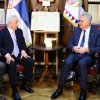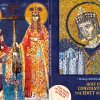Председник Србије је нобеловцу поклонио књигу „Хришћанско наслеђе на Косову и Метохији - историјско и духовно средиште српског народа”.
Николић и Љоса разговарали су и о борби која је после тог распада настала за доказивање идентитета у неким новонасталим Републикама.
„Србија није пролазила кроз ту фазу, ми имамо вишевековну традицију и јасан национални идентитет, посвећени смо помирењу, али је још увек много бола у сећању народа”, рекао је председник Републике.
Љоса је говорио о Југославији и њеном угледу и значају у Латинској Америци.
„Југославија је била веома присутна и позната у Перуу и на неки начин била узор”, рекао је Љоса.
.Председник Николић и перуански писац разговарали су и о актуелном проблему емиграције.
Љоса је истакао да Шпанија има мањи проблем са наталитетом због емиграната, а посебно га је занимао проблем емиграције у Србији, а Николић рекао да Србија има проблем са транзитним емигрантима.
„Нажалост, Мађарска жели због њих да подигне зид између две земље, како би спречила улазак емиграната”, нагласио је председник Николић.
Он је додао да „Србија има проблем што је признавање дела њене територије Косова и Метохије очигледна препрека да добије пуноправно чланство у Европској унији”.
„Ми смо спремни да уђемо у Европску унију више него неке чланице. Грађани су већ уморни од чекања”, поручио је председник Николић и додао да Европа има предрасуде о односу Србије према Русији.
Николић је подвукао да Србија никада није пропадала никоме, већ само себи.
„Једино нас је Отоманска империја држала у вишевековном ропству. Косовска битка је спречила да Турска продире даље у Европу. Током владавине Турака, Србима није било дозвољено да праве куће од чврстог материјала, већ само од блата и једина чврста грађевина је била сачињена од српских лобања у Нишу”, рекао је председник Николић.
Љоса се захвалио председнику Николићу на пријему и величанственој причи о српском народу, пише у саопштењу.
„Нисам се сусретао са много председника који тако добро познају културу и историју. Заиста сам очаран”, нагласио је Љоса.
Танјуг
Политика, 23. 6. 2015.






